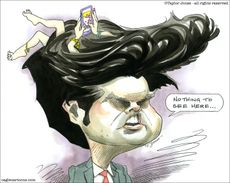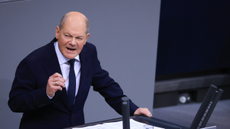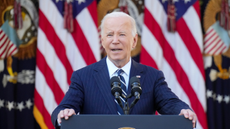The truth about masks
Let's cut to the chase. Are masks effective at stopping the spread of coronavirus?

Health officials now recommend that people cover their faces in public places. Are masks effective? Here's everything you need to know:
How do masks fight COVID-19?
The mouth and nose are usually where the coronavirus first sets up camp, and also serve as the portals for spreading the virus to new hosts. The saliva of infected people teems with virus particles, which are emitted in droplets when they cough or sneeze. Smaller drops, called aerosols, are launched when a person speaks or even just breathes. Larger droplets are thought to be the primary means of transmission and can be propelled six or more feet before gravity pulls them down to the ground. Aerosol droplets can hang in the air, still viable and potentially capable of causing infection, for hours, especially in enclosed spaces with poor ventilation. By serving as a barrier, masks block the droplets expelled by an infected person and slow the velocity of particles that sneak through. To a lesser extent, they protect the wearer from receiving particles in their own mouth and nose.
Subscribe to The Week
Escape your echo chamber. Get the facts behind the news, plus analysis from multiple perspectives.

Sign up for The Week's Free Newsletters
From our morning news briefing to a weekly Good News Newsletter, get the best of The Week delivered directly to your inbox.
From our morning news briefing to a weekly Good News Newsletter, get the best of The Week delivered directly to your inbox.
How effective are masks?
Though different studies reach varying statistical conclusions, the overwhelming consensus is that they help stem transmission. Jeremy Howard, an Australian data scientist who created the website Masks4All.co, has identified 34 papers showing their effectiveness, and none that show otherwise. Researchers from the National Institutes of Health performed a video experiment that offered a stark visual rendering of how masks work. They used laser light to illuminate the shower of droplets emitted when someone speaks and demonstrated how nearly all of them were blocked by a mask. A team of scientists and academics from Europe and California recently built a computer simulation demonstrating that if 80 percent of the population wore masks, infection rates would plunge by more than 90 percent. That finding lines up with remarkably low infection rates in Asian countries where mask wearing is near-universal, including Hong Kong and Taiwan, each of which has had fewer than 10 deaths despite high population density. "The countries that flattened the curve used masks in public," Dutch disease expert Chris Kenyon told the BBC.
Do masks protect the wearer?
Not perfectly, but yes. One meta-study funded by the World Health Organization that analyzed 64 scientific papers found that masks dropped wearers' risk of infection by between 50 and 80 percent. And while N95 masks — which block 95 percent of particles 0.3 microns or larger — fare the best, surgical and cloth masks can also be highly successful. One study found that for inward protection, N95 masks were 99 percent effective, surgical masks 75 percent, and a cloth tea towel 67 percent. Even if some virus gets through, scientists theorize, reducing the amount can make a big difference. If the initial exposure is large, the virus may overwhelm the immune system and cause serious illness. If it's relatively small, a mask wearer may get a mild case or none at all.
Sign up for Today's Best Articles in your inbox
A free daily email with the biggest news stories of the day – and the best features from TheWeek.com
Why are masks controversial?
Early in the pandemic, mixed signals from health officials created confusion. While the Centers for Disease Control and Prevention now recommends that people wear masks, it initially told them not to. At the time, the CDC was worried that the public would hoard medical-grade masks needed by frontline workers. Health officials also worried that untrained mask wearers would contaminate their masks or their hands by mishandling them, thus increasing their risk, and that masks might give wearers a false sense of security. While the strong consensus is now in favor of masks, experts warn that they're not magical shields, just part of an arsenal that includes handwashing and social distancing. "Putting a face mask on does not mean that you stop the other practices," said May Chu, an epidemiologist at the Colorado School of Public Health.
What kind of mask should I wear?
N95 masks should be kept for medical professionals. But if you have a stray one around the house, it offers the highest protection as long as it's properly worn, with no gaps between your face and the mask. Commercially available surgical masks can be highly effective, studies have found. Cloth masks also provide protection, but to varying degrees. A Wake Forest University study found great variation depending on the materials used, with the best ones reaching 79 percent filtration. Look for materials with a dense weave, such as quilter's cotton, flannel, or pillowcases with a high thread count, and use a double layer. Including a filter — such as a piece cut from a coffee filter or vacuum cleaner bag — increases effectiveness but may inhibit breathing. Masks should fit snugly against the face and reach below the chin and up to the bridge of the nose. Wash them after each use, and when removing them, handle them by the straps — never the protective material, which could be contaminated — and wash your hands directly before and after. "Wearing a mask takes some getting used to, for sure," said Scott Segal, chairman of anesthesiology at Wake Forest Baptist Health. If it's a little stuffy, "you are probably wearing it exactly right."
Turning masks into partisan symbols
If masks are so effective, why are some Americans so resistant to wearing them? Given that we have no history of mask wearing, it's not surprising they seem alien. But the major reason is the degree to which the pandemic has been politicized. To supporters of President Trump (who has insisted on going maskless, reportedly because he thinks it would make him look "weak" to wear one), masks indicate a groundless fear of a virus whose dangers they believe are exaggerated in order to limit their freedom. When masks become a tribal marker, being asked to wear one is "like asking a Red Sox fan to put on a Yankees jersey," psychologist Seth Gillihan wrote in Psychology Today. Psychologists point to other conscious and unconscious factors. Some people may think that mask wearing would reveal feelings of vulnerability, running counter to an evolutionary trait that predisposes us to disguise fear. Wearing a mask also conveys an acknowledgment that our old lives are gone, at least for now. Put on a mask, said clinical psychologist David Abrams, and "you've suddenly admitted that this is the new normal."
This article was first published in the latest issue of The Week magazine. If you want to read more like it, you can try six risk-free issues of the magazine here.
-
 5 contentious cartoons about Matt Gaetz's AG nomination
5 contentious cartoons about Matt Gaetz's AG nominationCartoons Artists take on ethical uncertainty, offensive justice, and more
By The Week US Published
-
 Funeral in Berlin: Scholz pulls the plug on his coalition
Funeral in Berlin: Scholz pulls the plug on his coalitionTalking Point In the midst of Germany's economic crisis, the 'traffic-light' coalition comes to a 'ignoble end'
By The Week UK Published
-
 Joe Biden's legacy: economically strong, politically disastrous
Joe Biden's legacy: economically strong, politically disastrousIn Depth The President boosted industry and employment, but 'Bidenomics' proved ineffective to winning the elections
By The Week UK Published
-
 Long Covid: study shows damage to brain's 'control centre'
Long Covid: study shows damage to brain's 'control centre'The Explainer Research could help scientists understand long-term effects of Covid-19 as well as conditions such as MS and dementia
By The Week UK Published
-
 FDA OKs new Covid vaccine, available soon
FDA OKs new Covid vaccine, available soonSpeed read The CDC recommends the new booster to combat the widely-circulating KP.2 strain
By Peter Weber, The Week US Published
-
 Mpox: how dangerous is new health emergency?
Mpox: how dangerous is new health emergency?Today's Big Question Spread of potentially deadly sub-variant more like early days of HIV than Covid, say scientists
By The Week UK Published
-
 What is POTS and why is it more common now?
What is POTS and why is it more common now?The explainer The condition affecting young women
By Devika Rao, The Week US Published
-
 Brexit, Matt Hancock and black swans: five takeaways from Covid inquiry report
Brexit, Matt Hancock and black swans: five takeaways from Covid inquiry reportThe Explainer UK was 'unprepared' for pandemic and government 'failed' citizens with flawed response, says damning report
By Harriet Marsden, The Week UK Published
-
 Should masks be here to stay?
Should masks be here to stay?Talking Points New York Governor Kathy Hochul proposed a mask ban. Here's why she wants one — and why it may not make sense.
By Anya Jaremko-Greenwold, The Week US Published
-
 Covid might be to blame for an uptick in rare cancers
Covid might be to blame for an uptick in rare cancersThe explainer The virus may be making us more susceptible to certain cancers
By Devika Rao, The Week US Published
-
 Long Covid and chronic pain: is it all in the mind?
Long Covid and chronic pain: is it all in the mind?The Explainer 'Retraining the brain' could offer a solution for some long Covid sufferers
By The Week UK Published